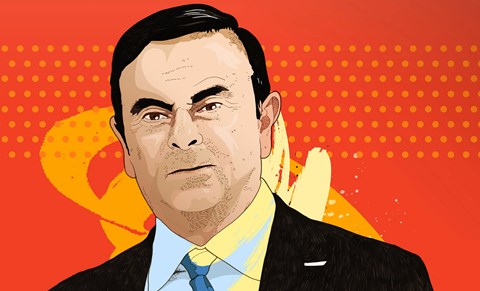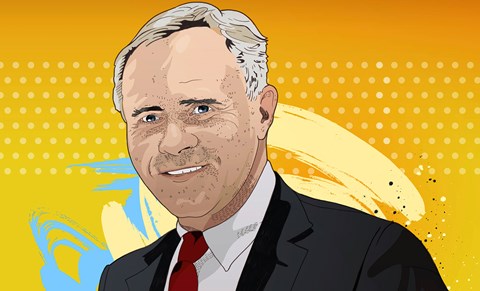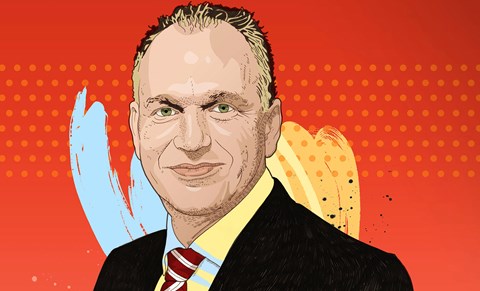► We interview four top car bosses
► From Wolfgang Durheimer of Bugatti…
► … to Carlos Ghosn of Renault-Nissan
Wolfgang Dürheimer: CEO, Bugatti and Bentley – ‘Reaction to the Speed 6 was positive. I would like to do it.’
We saw an ‘extended wheelbase’ new Mulsanne at Geneva. Will there be a long-wheelbase Bentayga?
‘A dealer from the Middle East has asked for a long wheelbase version. But a coupe version with the same wheelbase is our priority. The current Bentayga is already a big car!’
What’s the next major new Bentley?
‘Two possibilities. One is a production version of EXP10 Speed 6 – the concept we showed at Geneva last year. The reaction to it was overwhelmingly positive. The other option is a second version of Bentayga [the coupe]. We are defining a new segment for luxury SUVs and we know competitors are close behind us. So we want to keep setting the pace. We’ll make a decision by the end of 2016 – but I’d eventually like to do both projects.’
When will we see a new Continental – the fundamental design is 13 years old?
‘If you study our cycle plan, you’ll see we have seven-year cycles. So we make changes after seven years and then again after 14 years.’
How does Bentley’s relationship with VW Group work from a financial perspective?
‘In terms of funding, we operate independently. We don’t get supplied from some huge VW financial tap. We need to make our own money. The current £840m investment in Crewe [on product and site expansion] is pressing ahead, the biggest single investment in many years. Other investments will always be subject to close scrutiny.’
What was your goal for the Chiron, Bugatti’s Veyron successor?
‘We started with the shortest development brief in my career, but the hardest to achieve: to make the best even better. It delivers 1479bhp and 1180lb ft, and up to 261mph for road use. Our customers like to go fast: the Chiron will blow their minds.’
What did dieselgate mean for your company?
‘We are a diesel-free zone, so it hasn’t affected sales. With the Bentayga we do have a 4.0-litre diesel V8 under development – and the engines will be available from autumn this year. We have now decided, for the time being, not to sell it in the US, although I still think it is perfect for America because of its mileage range. We may reconsider that decision.’

Carlos Ghosn CEO, Renault-Nissan – ‘We want to reach 100,000 EVs a year. We’re not far off.’
Does the diesel situation make you glad you backed electric vehicles?
‘Yes. We produce more than half the world’s electric cars and have now sold 300,000 EVs in total. We now want to reach 100,000 a year – we are not far off that. More and more consumers are becoming interested in EVs. This will only increase as we improve the cost and range of our batteries, and as the charging infrastructure improves. We are at breakeven or making a profit with our EVs in some markets.’
Why are you going back into F1 with Renault?
‘Because for the next five to six years we are going on a big push in emerging markets – in China, India, South America and Iran. These are markets where Renault needs to raise awareness and where F1 still has a huge following. It’s basic business planning: we decided how much resource we needed to invest to reach our planned objectives. We realised we should invest in F1 to follow our industrial strategy.’
What’s your outlook for the global car industry in 2016?
‘We expect to see 1-2% growth this year. The strong markets for us are China, India and Europe – the latter grew 6% last year. The US should remain stable, maybe 1-2% up. But the tough markets are Japan, Russia and Brazil. We lost €600 million in Russia last year in our joint venture with AvtoVAZ. We will not withdraw from the market, but we will look at investments, capacity adjustments and product lifecycles.’
What’s the idea with the new Scenic?
‘We are adapting to a changing marketplace. Crossovers are developing fast – so we’ve decided to reinvent some of our more classical products. The Kadjar will conquest from a sector Renault was absent from, leaving the new Scenic to appeal to a different type of buyer.’
What did dieselgate mean for your company?
‘The percentage of diesel orders is going down in some countries. It’s too early to say by how much. It will decrease in percentage terms, I’m sure. Especially as the cost [of emissions compliance tech and exhaust after-treatment] will continue to grow.’

Harald Wester: CEO, Maserati and Alfa Romeo – ‘You’ll see a Maserati hybrid no later than 2018.’
How big can you grow with the new Levante crossover?
‘We currently sell around 32,000 cars a year. We started building the Levante on 29 February and this year we should surpass our previous record and produce 40,000 cars. Next year we want to crack the 50,000 barrier.’
Could a Maserati SUV annoy traditionalists?
‘The Levante is consistent with what a Maserati should be: it must drive like a Maserati, smell like a Maserati and look like a Maserati. It gives our customers the same feelings and freedoms as our sports cars. This segment is bigger than all the other luxury segments put together – the Levante will be by far our most important volume product.’
You’re producing more and more diesel cars!
‘Diesel is still very popular, so we have to respond. The UK has one of the highest penetrations of diesel in the luxury segment – it’s 95%! Across Europe, 80% of Ghiblis are diesel-powered.’
Isn’t a hybrid solution better for you?
‘It is coming, we have the solution in the group: the Chrysler Pacifica you saw at the Detroit show provides the batteries and systems we’ll use. We’ll act as a group and you should see a Maserati hybrid no later than 2018. As all Maseratis share the same architecture, we can use it in every model. They are all ready for this technology. The ZF eight-speed transmission can easily be adapted for hybrid use.’
Will you copy BMW and build different bodystyles of Levante?
‘No, we are a niche player. That’s something we’ll let the other car makers do.’
The crossover’s been a long time coming. Why is it so late?
‘It is a little bit late, yes. We first showed the Kubang in 2011, then in Detroit in 2012 we said we’d build it at a Jeep plant in the US, but in the 12 months after that we revisited everything. Frankly, it scared the sh*t out of me. After a lot of discussions we decided in spring 2012 to produce the Levante in Italy. It will be 100% Maserati.’
So there isn’t any Jeep tech onboard?
‘No. It is ours. It’s the same four-wheel- drive system as in Ghibli and Quattroporte. The engines, transmissions, electrical architectures, infotainment are common. And this is our first move into the advanced driver assistance systems, such as active cruise control.’
What did dieselgate mean for your company?
‘Zilch. It does not affect what Maserati is doing in the slightest. We have urea exhaust after-treatment already in production and we trust our emissions testing procedures. A German newspaper tested the Ghibli after the scandal – and it came in the top 10% of cars tested for real-world economy.’

Jürgen Stackmann Sales/marketing chief, VW – ‘Only time and action will convince people dieselgate won’t happen again.’
How do you regain trust post-dieselgate?
‘That’s our goal for 2016. The technology to [correct the emissions levels] is software, and it’s bloody hard work to return the car to owners with no change. People love their cars and want the same noise, power, fun. I’m confident for the vast majority, we will be able to achieve that.’
How long will it take to return to normal?
‘People will forgive, I’m convinced of that, but for some time there will be latent reference to it. Toyota was a different category, and it took them a year-and-a-half to recover. I think that’s a realistic timeframe for customers to feel comfortable. We will publish our internal investigation’s results in Q2. We are as interested in the analysis as you are. We were shocked this could happen to VW.’
How will VW decentralise?
‘Separating group from brand is one of the most far-reaching things we’ve done. All brands at VW have their own boss. The group leadership team is not responsible for steering individual [brands’] strategy but for creating synergy for key projects.’
How will Volkswagen change on the road ahead?
‘Everyone loves VW’s substance, technology, love of detail. But some things were maybe not so well taken care of. We want to be a leader in connectivity and we aren’t yet, likewise in electromobility. There are a lot of enabling factors in China: the west coast area is not growing as it’s becoming impossible to get new licence plates. That will swiftly move to electromobility. China will be the first with widespread adoption of electric cars.’
What else can we expect?
‘We are struggling in markets with low price levels, where we have never cracked the value formula. We don’t have any presence in Africa, India is a classic example.
How do you find your way in?
We will have more regional focus, and localisation.’
What did dieselgate mean for your company?
‘A wake up-call. We have to seriously address the issues, and with the personnel changes ensure this can’t happen again. It will take a while for customers to believe that, you can only do it with actions. €6.5bn is set aside: we will see if we need more.’
Read more CAR news here